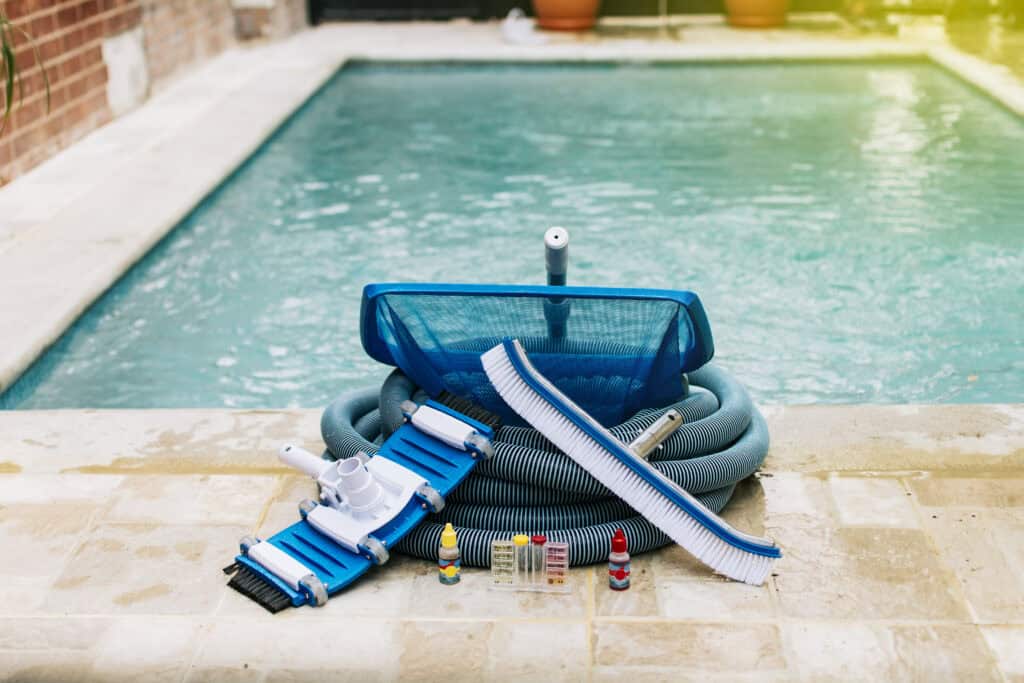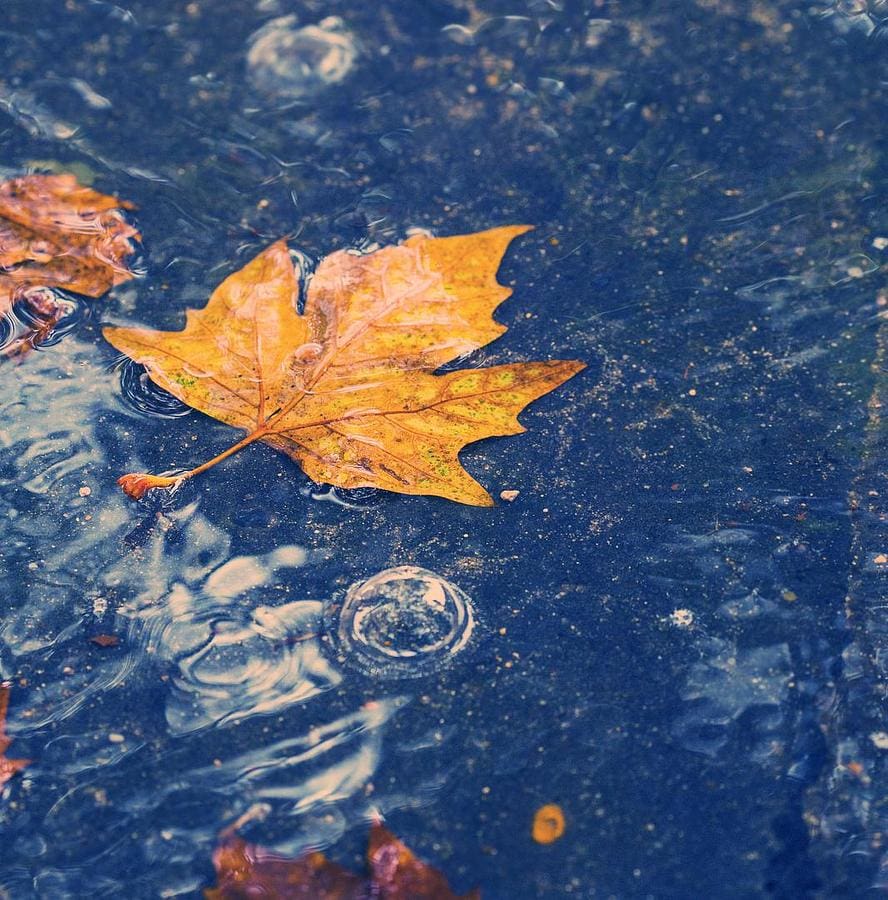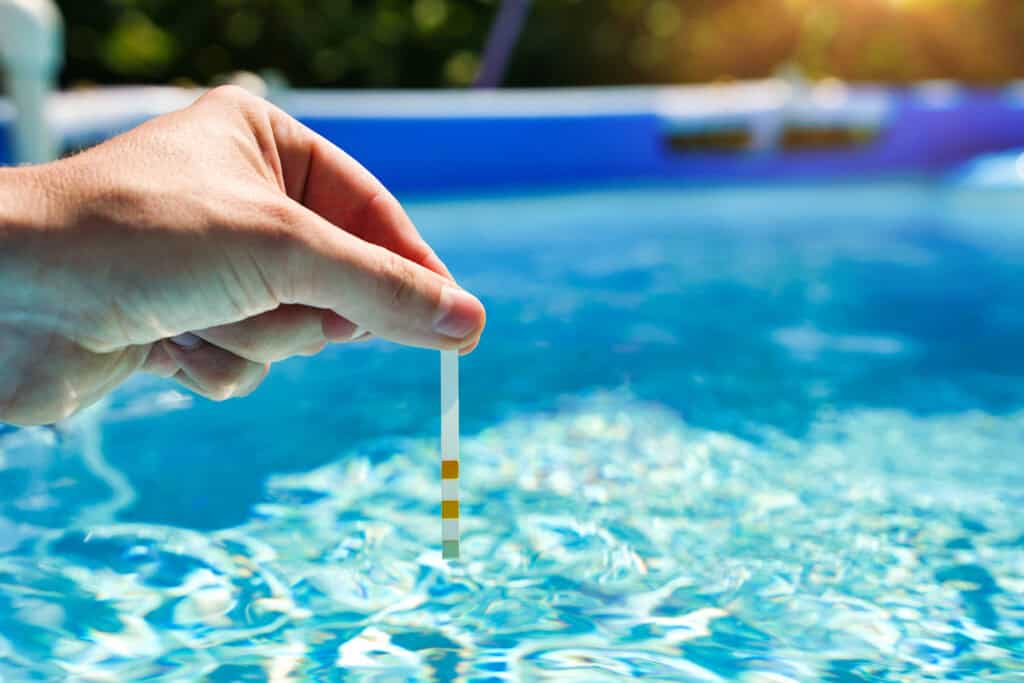
Maintaining a sparkling pool in Tennessee means battling four distinct seasons that each bring unique challenges to your backyard oasis. From summer algae blooms to fall leaf invasions, your pool requires specific care strategies that change with the calendar.
These essential pool maintenance tips will help you protect your investment while maximizing your swimming season, no matter the season you’re facing. With the right approach, you’ll spend less time cleaning and more time enjoying your pool with family and friends.
Contents
Tennessee’s Climate and Pool Health
Tennessee’s four-season climate creates specific challenges for pool maintenance throughout the year. Hot, humid summers promote algae growth, while fall brings leaves that clog filters and stain surfaces. Spring introduces pollen and rainwater that affect chemical balance, and winter temperatures require proper winterization to prevent equipment damage.
These seasonal patterns require tailored Tennessee pool maintenance tips that protect your investment and extend your swimming season.
Must-Have Tools and Supplies

Every Tennessee pool owner needs reliable testing supplies to monitor water chemistry through changing weather conditions. A telescopic pole with interchangeable attachments makes daily maintenance more efficient.
Essential pool maintenance tools include:
- Testing kits for pH, chlorine, and alkalinity
- Skimmer nets for debris removal
- Pool brush for wall and floor cleaning
- Vacuum head and hose
- Leaf nets (especially for fall)
- Quality chemicals (chlorine, pH adjusters, algaecide)
- Durable pool cover
For more of our favorite pool accessories for homeowners to enjoy their backyard oasis and perform regular maintenance, visit the Pool Brokers USA Guide to Best Pool Accessories.
Steps for Each Tennessee Pool Season
1. Spring Prep
Remove and clean your winter cover, checking for damage before storage. Test and balance water chemistry, paying special attention to pH levels that may have shifted during winter.
Clean or replace filter cartridges and inspect all equipment for damage after winter dormancy. Brush pool walls and floor thoroughly to remove any algae that formed during the off-season.
2. Summer Algae Prevention
Skim the pool surface daily to remove insects, pollen, and debris before they sink. Brush walls and steps weekly to prevent algae from gaining a foothold in Tennessee’s humid conditions.
- Chemical balance: Maintain proper chlorine levels between 1-3 ppm, testing more frequently during hot July and August days.
- Filtration: Run your system at least 8-10 hours daily during peak summer months.
- Weekly shock: Apply after heavy use or rainstorms to eliminate contaminants and prevent cloudy water.
3. Fall Leaf Control
Increase skimming frequency as Tennessee’s trees shed their colorful foliage. Install a leaf net over your main pool cover to make removal easier and prevent staining.

Vacuum the pool floor more thoroughly as debris accumulates faster in the fall. Consider trimming overhanging branches to reduce leaves falling directly into your pool.
4. Winterizing Basics
Lower the water level below skimmer openings to prevent freeze damage to plumbing. Add winterizing chemicals according to your pool size to maintain water quality during dormant months.
Drain all equipment, including pumps, filters, and heaters, to prevent freeze damage during Tennessee’s occasional cold snaps. Install a quality winter cover secured tightly and check it periodically throughout winter.
Year-Round Chemical Balance

Test your pool water weekly during swimming season and bi-weekly during the off-season. Proper pool maintenance tips for water chemistry include keeping pH between 7.2-7.6 to ensure swimmer comfort and maximize chlorine effectiveness.
Maintain total alkalinity between 80-120 ppm to prevent pH fluctuations common with Tennessee’s variable rainfall. Calcium hardness should stay between 200-400 ppm to protect your pool surface and equipment.
Adjust chlorine levels seasonally, higher in summer’s heat and UV exposure, lower during cooler months when usage decreases.
Equipment Maintenance
Clean or backwash your filter monthly during peak season and whenever pressure readings indicate restriction. Inspect pump baskets weekly to remove debris that reduces water flow and strains motors.
Seasonal checks:
- Spring: complete system inspection before swimming season
- Summer: Weekly basket cleaning and pressure monitoring
- Fall: Heater testing before cooler weather arrives
- Winter: Equipment drainage and protection
Consider professional equipment inspection each spring to catch potential issues before they become costly repairs.
Cost-Saving Techniques for DIY Enthusiasts in Tennessee
Run your pump during off-peak electricity hours to reduce energy costs, especially during Tennessee’s hot summer months. Use a pool cover consistently to minimize water evaporation, chemical loss, and heating expenses.
Money-saving maintenance tips:
- Test water chemistry yourself instead of hiring services
- Learn basic troubleshooting for common issues
- Maintain proper chemical balance to avoid expensive remediation
- Consider upgrading to energy-efficient equipment
- Follow common pool maintenance tips for seasonal care to prevent major problems
These practical pool maintenance tips help you avoid service call fees while keeping your pool in excellent condition.
Your Next Steps
Maintaining your pool through Tennessee’s changing seasons doesn’t have to be overwhelming. With the right tools, a consistent schedule, and seasonal adjustments, you can enjoy crystal-clear water whenever you’re ready to swim.
Fiberglass pools require less maintenance and fewer chemicals than traditional pools, making them ideal for Tennessee’s variable climate. Pool Brokers USA offers flexible financing options and expert guidance for homeowners looking to upgrade to a low-maintenance fiberglass pool.
Our fiberglass pools are designed to withstand Tennessee’s climate variations while minimizing the time you spend on upkeep. Ready to learn more about how a low-maintenance fiberglass pool could enhance your backyard experience? Request a Quote today.
